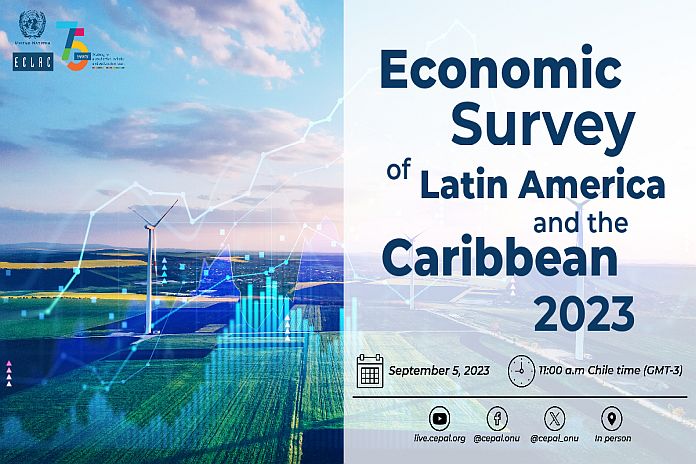– New growth projections for the region’s countries
SANTIAGO, Chile – The United Nations regional organization’s executive secretary, José Manuel Salazar-Xirinachs, will lead a press conference to unveil the report next Tuesday, September 5 in Santiago, Chile.
The Economic Commission for Latin America and the Caribbean (ECLAC) will release next Tuesday, September 5 its Economic Survey of Latin America and the Caribbean, 2023. Financing a sustainable transition: investment for growth and climate change action, one of the institution’s flagship annual economic reports in which it takes stock of the region’s economies in recent months and updates its growth estimates for each country.
This document is the United Nations regional commission’s oldest periodic publication, with its first edition having been presented in 1948, the same year in which ECLAC was founded. Now, in its 75th edition corresponding to 2023, it summarizes the performance of the region’s economy and analyzes its evolution this year. In addition, exceptionally, it will provide ECLAC’s first 2024 growth projections for Latin American and Caribbean countries.
In addition to examining the region’s macroeconomic situation, the second part of the Economic Survey 2023 addresses the role of investment for growth and climate change action, along with the financing of a sustainable transition.
The report, which is prepared each year by ECLAC’s economic development division will be presented during a hybrid (in-person and virtual) press conference at the organization’s central headquarters in Santiago, Chile at 11 a.m. local time (UTC/GMT -3), led by its executive secretary, José Manuel Salazar-Xirinachs.
According to the report, the countries of Latin America and the Caribbean will continue to face a very complex economic and social scenario. It is forecast that low economic and international trade growth will persist and that despite declines in inflation, high-interest rates and lower global liquidity will continue, which entail high financing costs for the region. In this context, it is expected that growth will remain low for the region’s economies in 2023 and 2024, with limited fiscal space to address growing demands for social expenditures and investment.
The second part of the document examines the impact of climate shocks on growth and public debt dynamics, along with investment and financing challenges for tackling climate change. The detailed figures that flesh out these realities will be unveiled during the launch.
As usual, the Economic Survey will include individual notes on the economic performance of each Latin American and Caribbean country in 2022 and the first half of 2023, along with their respective statistical annexes, which will be available on ECLAC’s website.





